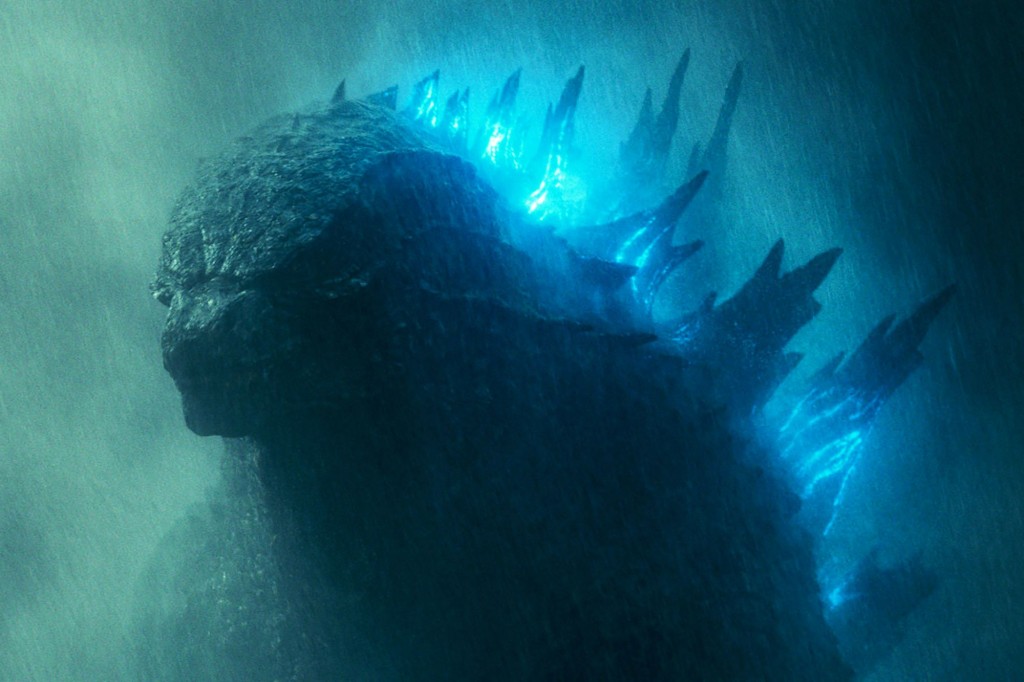The world is ending. And even if politicians don’t know it, blockbuster cinema does.
Godzilla: King of the Monsters, the lizard king’s thirty-fifth film and the third in Legendary’s MonsterVerse (sigh) franchise, begins soaked in the visual vocab of disaster. Fire, rain, rubble, and parents screaming the names of buried children. In the background, skydiving trails signal the stand-out set-piece from 2014’s Godzilla, whose domestic drama has been swapped for Vera Farmiga and Kyle Chander’s estranged married couple and their daughter (Stranger Things’ Millie Bobby Brown) dealing with the realities of a post-monster world. Sort of, but not really: King of the Monsters struggles to convert its big, abstract ideas into storytelling that feels as big as its beloved beasties.
Gareth Edwards’ Godzilla had its problems, but something it understood was the importance of communicating not simply size, but the impression of size. There’s a reason the juiciest parts of monster disaster drama tend to be the buildup, the glimpses, the hushed panic and, of course, the close-ups of people turning and looking off-camera at some spectacular impossibility.
There’s a lot of turning and looking in Godzilla: at the big man himself, at the Avengers-style assemblage of Titans, at important data on a screen. The Spielberg Face has become, by now, a well-mocked super-trope, but blockbusters like this remind you how hard it is to nail those moments of awe and revelation, and how skilful Spielberg was at managing the proportions of the big and the small, connecting pulpy horrors to ordinary people and their astonishment.
Michael Dougherty and Zack Shields (the former directs) populate the human element of Godzilla with basic, near-archetypal motivations, and leave them running on automatic. Emma Russell (Farmiga) has developed a kind of Titan sonar to help communicate with the proliferating giants— say hello to Mothra, Rodan and King Ghidorah — and gets wrapped up in Charles Dance’s plan to resurrect the old gods and “restore balance” to a chaotic, polluted world.
Chandler’s Mark Russell is a tough-talker who just wants his family back, and does table-banging outbursts about how Monarch, the monsters’ official wranglers, are playing God, dammit. Thomas Middleditch is a twitchy nerd. The always-welcome Bradley Whitford is a scientist with a dry Whitfordian tongue. Ken Watanabe says pseudo-profound things about having faith in Godzilla’s benevolence. Ziyi Zhang is an academic who pulls up info-dumps on the fly as if ever other scientist in the room is an idiot. Lacking even the faintest cadence of how people actually talk to one another, every looking-at-screens scene is peppered with boilerplate, scary number dialogue. 100 feet and closing! ETA 90 seconds!
Dramatically, King of the Monsters feels small, people in rooms hatching plans, then changing them, the story swinging this way and that. A bizarre extra-terrestrial details about the Titans is suggested, and everyone just accepts it immediately. There is over-explaining and under-reacting. When a character jumps ship to the bad guys and outlines her reasons — a fashionable Malthusean cynicism — the screen flashes up visual cues, like she’s giving a PowerPoint titled “Mankind is the Infection”.
There is something potentially interesting and relevant here. Born in the mushroom cloud, Godzilla is an ideal metaphorical conduit for climate change panic, and vaguer, nameless anxieties of humans vulnerable to hostile forces larger than themselves. But this is first-draft construction that cedes attention to the kaijus without giving them memorable visual personality. By the time we get to their inevitable twelve rounds, it’s a climax with the impersonal grandeur of the wind boxing the hail. And it’s hard to get excited about the weather. Conor Smyth
Godzilla: King of the Monsters is out on wide release.






